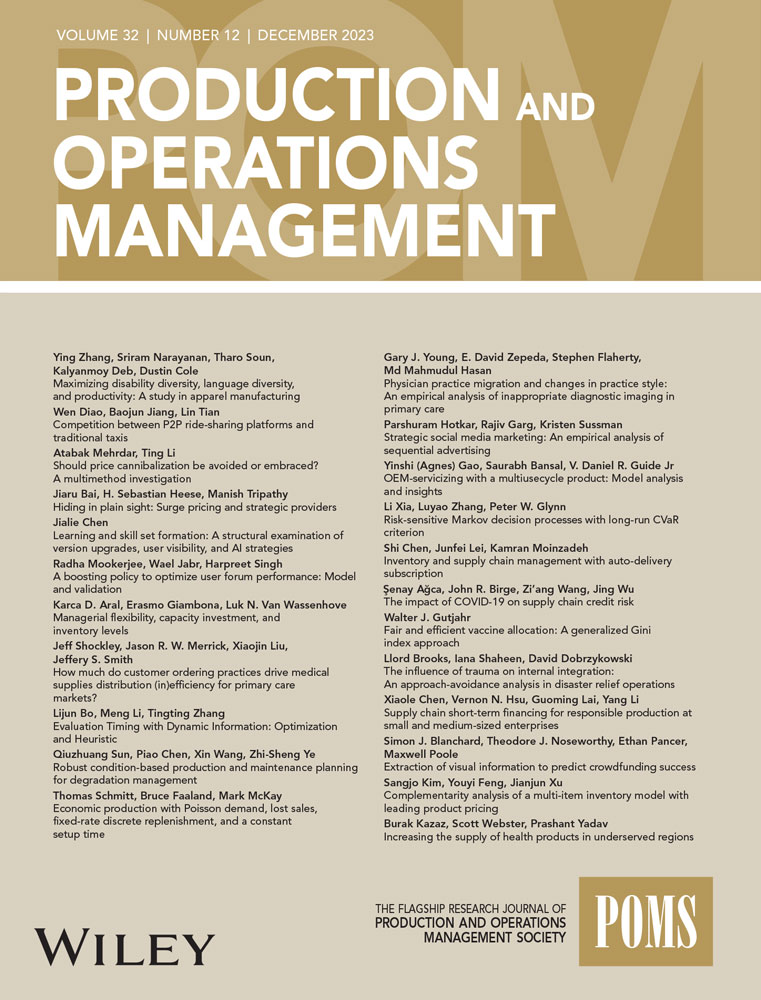EXPRESS: Product Customization and Returns: the Moderating Role of National Culture
IF 4.8
3区 管理学
Q1 ENGINEERING, MANUFACTURING
引用次数: 0
Abstract
Product customization enables consumers to tailor products to their individual preferences. One benefit of customization is its lower volume of returns. By customizing, consumers learn about their product preferences and develop a sense of attachment to the products they help “create.” As a result, they are less likely to return the purchased items. The effect of product customization on returns may depend on cultural traits of consumers, such as the extent to which they would avoid uncertainty or the degree to which they would feel “subordinate” to authority. Hence, this article studies how national cultures moderate the negative relationship between customization and returns. Our investigation analyzes a unique dataset from a leading global luxury brand manufacturer that offers both standard and customized versions of a product across more than 20 countries. We find that the disparity in return rates between standard (higher rate) versus customized products (lower rate) depends on the cultural dimensions originally introduced by Hofstede. This gap widens with masculinity and uncertainty avoidance, but narrows with power distance and individualism. Therefore, multinational firms should weigh these aspects of national cultures when designing both customization and return policies.快讯产品定制与退货:民族文化的调节作用
产品定制使消费者能够根据个人喜好定制产品。定制的一个好处是退货率较低。通过定制,消费者可以了解自己的产品偏好,并对自己帮助 "创造 "的产品产生依恋感。因此,他们不太可能退货。产品定制对退货的影响可能取决于消费者的文化特征,如他们在多大程度上会避免不确定性,或在多大程度上会觉得自己 "从属于 "权威。因此,本文研究了民族文化如何调节定制与退货之间的负相关关系。我们的调查分析了一个独特的数据集,该数据集来自一家全球领先的奢侈品牌制造商,该制造商在 20 多个国家同时提供标准版和定制版产品。我们发现,标准产品(回报率较高)与定制产品(回报率较低)之间的回报率差距取决于霍夫斯泰德最初提出的文化维度。这种差距随着男性气质和避免不确定性而扩大,但随着权力距离和个人主义而缩小。因此,跨国公司在设计定制和退货政策时,应权衡民族文化的这些方面。
本文章由计算机程序翻译,如有差异,请以英文原文为准。
求助全文
约1分钟内获得全文
求助全文
来源期刊

Production and Operations Management
管理科学-工程:制造
CiteScore
7.50
自引率
16.00%
发文量
278
审稿时长
24 months
期刊介绍:
The mission of Production and Operations Management is to serve as the flagship research journal in operations management in manufacturing and services. The journal publishes scientific research into the problems, interest, and concerns of managers who manage product and process design, operations, and supply chains. It covers all topics in product and process design, operations, and supply chain management and welcomes papers using any research paradigm.
 求助内容:
求助内容: 应助结果提醒方式:
应助结果提醒方式:


